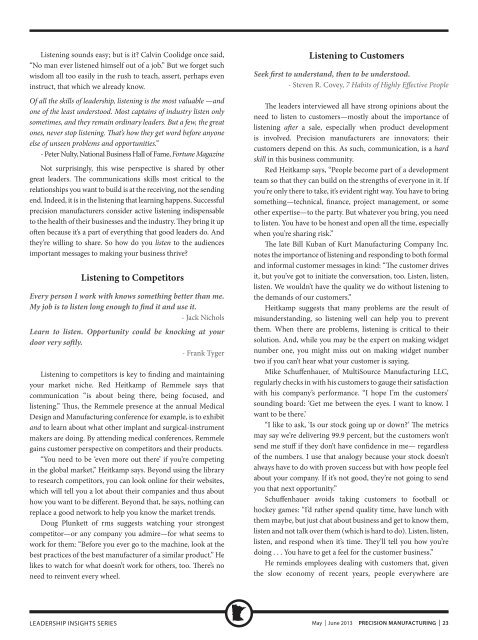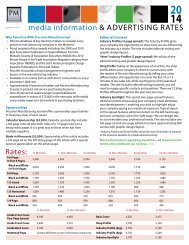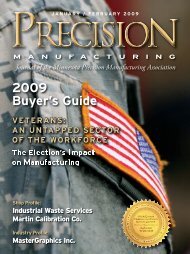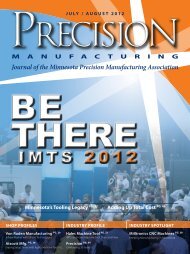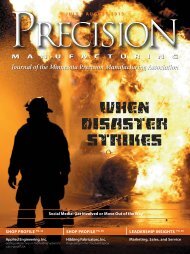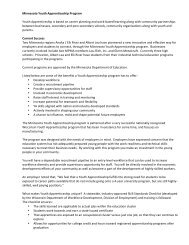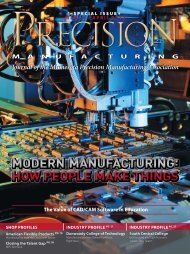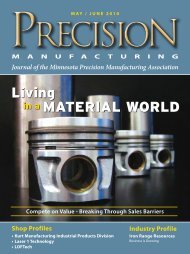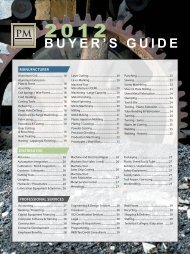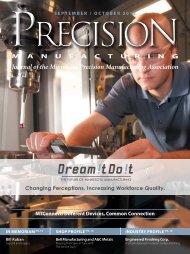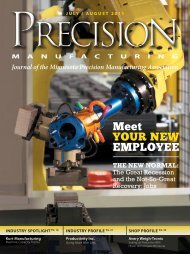JUNE 2013 - Minnesota Precision Manufacturing Association
JUNE 2013 - Minnesota Precision Manufacturing Association
JUNE 2013 - Minnesota Precision Manufacturing Association
- No tags were found...
Create successful ePaper yourself
Turn your PDF publications into a flip-book with our unique Google optimized e-Paper software.
Listening sounds easy; but is it? Calvin Coolidge once said,“No man ever listened himself out of a job.” But we forget suchwisdom all too easily in the rush to teach, assert, perhaps eveninstruct, that which we already know.Of all the skills of leadership, listening is the most valuable —andone of the least understood. Most captains of industry listen onlysometimes, and they remain ordinary leaders. But a few, the greatones, never stop listening. That’s how they get word before anyoneelse of unseen problems and opportunities.”- Peter Nulty, National Business Hall of Fame, Fortune MagazineNot surprisingly, this wise perspective is shared by othergreat leaders. The communications skills most critical to therelationships you want to build is at the receiving, not the sendingend. Indeed, it is in the listening that learning happens. Successfulprecision manufacturers consider active listening indispensableto the health of their businesses and the industry. They bring it upoften because it’s a part of everything that good leaders do. Andthey’re willing to share. So how do you listen to the audiencesimportant messages to making your business thrive?Listening to CompetitorsEvery person I work with knows something better than me.My job is to listen long enough to find it and use it.- Jack NicholsLearn to listen. Opportunity could be knocking at yourdoor very softly.- Frank TygerListening to competitors is key to finding and maintainingyour market niche. Red Heitkamp of Remmele says thatcommunication “is about being there, being focused, andlistening.” Thus, the Remmele presence at the annual MedicalDesign and <strong>Manufacturing</strong> conference for example, is to exhibitand to learn about what other implant and surgical-instrumentmakers are doing. By attending medical conferences, Remmelegains customer perspective on competitors and their products.“You need to be ‘even more out there’ if you’re competingin the global market,” Heitkamp says. Beyond using the libraryto research competitors, you can look online for their websites,which will tell you a lot about their companies and thus abouthow you want to be different. Beyond that, he says, nothing canreplace a good network to help you know the market trends.Doug Plunkett of rms suggests watching your strongestcompetitor—or any company you admire—for what seems towork for them: “Before you ever go to the machine, look at thebest practices of the best manufacturer of a similar product.” Helikes to watch for what doesn’t work for others, too. There’s noneed to reinvent every wheel.Listening to CustomersSeek first to understand, then to be understood.- Steven R. Covey, 7 Habits of Highly Effective PeopleThe leaders interviewed all have strong opinions about theneed to listen to customers—mostly about the importance oflistening after a sale, especially when product developmentis involved. <strong>Precision</strong> manufacturers are innovators; theircustomers depend on this. As such, communication, is a hardskill in this business community.Red Heitkamp says, “People become part of a developmentteam so that they can build on the strengths of everyone in it. Ifyou’re only there to take, it’s evident right way. You have to bringsomething—technical, finance, project management, or someother expertise—to the party. But whatever you bring, you needto listen. You have to be honest and open all the time, especiallywhen you’re sharing risk.”The late Bill Kuban of Kurt <strong>Manufacturing</strong> Company Inc.notes the importance of listening and responding to both formaland informal customer messages in kind: “The customer drivesit, but you’ve got to initiate the conversation, too. Listen, listen,listen. We wouldn’t have the quality we do without listening tothe demands of our customers.”Heitkamp suggests that many problems are the result ofmisunderstanding, so listening well can help you to preventthem. When there are problems, listening is critical to theirsolution. And, while you may be the expert on making widgetnumber one, you might miss out on making widget numbertwo if you can’t hear what your customer is saying.Mike Schuffenhauer, of MultiSource <strong>Manufacturing</strong> LLC,regularly checks in with his customers to gauge their satisfactionwith his company’s performance. “I hope I’m the customers’sounding board: ‘Get me between the eyes. I want to know. Iwant to be there.’“I like to ask, ‘Is our stock going up or down?’ The metricsmay say we’re delivering 99.9 percent, but the customers won’tsend me stuff if they don’t have confidence in me— regardlessof the numbers. I use that analogy because your stock doesn’talways have to do with proven success but with how people feelabout your company. If it’s not good, they’re not going to sendyou that next opportunity.”Schuffenhauer avoids taking customers to football orhockey games: “I’d rather spend quality time, have lunch withthem maybe, but just chat about business and get to know them,listen and not talk over them (which is hard to do). Listen, listen,listen, and respond when it’s time. They’ll tell you how you’redoing . . . You have to get a feel for the customer business.”He reminds employees dealing with customers that, giventhe slow economy of recent years, people everywhere areLEADERSHIP INSIGHTS SERIESMay | June <strong>2013</strong> PRECISION MANUFACTURING | 23


